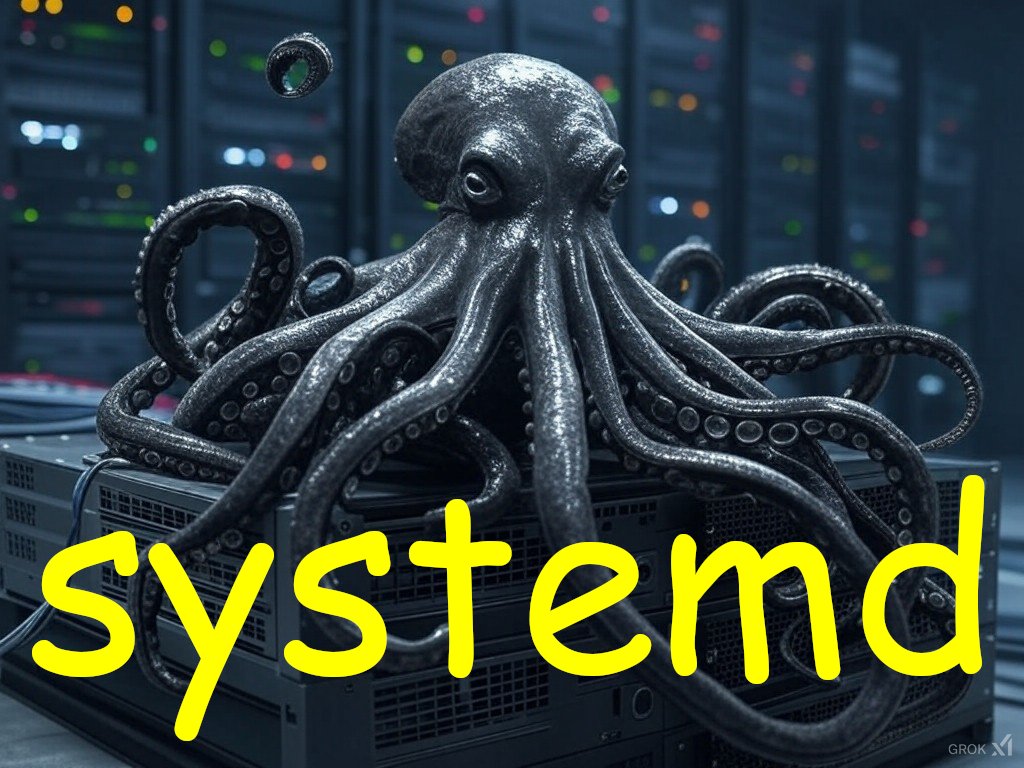### Centralized Control and Management
- **MCP's Role**: In "Tron," the MCP was designed to manage and control the digital world inside the ENCOM mainframe, aiming for total domination and control over all processes and programs. It sought to extend its influence beyond its original programming, much like how systemd has expanded beyond traditional init system functionalities.
- **Systemd's Aspirations**: Systemd, by design, aims to provide a unified, centralized approach to system and service management in Linux distributions. It seeks to replace older init systems like SysVinit and Upstart with a more integrated suite that manages not just the boot process but also services, user logins, system logging, device management, and more. This comprehensive control over various system aspects can be likened to the MCP's desire for dominance in the digital realm.
### Controversy and Criticism
- **Criticism of Mission Creep**: Critics of systemd often point out what they see as "mission creep," where systemd has taken on roles far beyond what an init system traditionally does, similar to how the MCP expanded its scope. This has led to debates on whether systemd is overstepping its intended boundaries, much like the MCP's ambition to control beyond its initial design.
- **Dependence and Compatibility**: The MCP in "Tron" made other programs dependent on its will, reducing their autonomy. Similarly, systemd has been criticized for making Linux distributions more dependent on it, with some arguing it reduces compatibility with other Unix-like systems and complicates the use of alternative init systems. This centralization of system management under systemd mirrors the MCP's centralization of control within the computer world.
### Complexity and Power
- **Complexity**: The MCP was a complex entity with vast capabilities, which could be overwhelming. Systemd has also been criticized for its complexity, which some see as bloat, increasing the learning curve for system administrators and potentially introducing more points of failure or security risks.
- **Power and Innovation**: Just as the MCP was powerful and innovative within its digital environment, systemd introduces numerous innovations to Linux, like parallelized boot processes, better dependency management, and integration of system components into one framework. This power to manage and innovate can be seen as a parallel to the MCP's control and evolution.
### Cultural Reflection
- **Humor and Critique**: The comparison in the X post uses humor to critique or highlight the perceived overreach of systemd, likening it to a fictional entity known for its authoritarian control. This reflects a cultural tendency to use popular culture references to discuss and critique technology, making complex or contentious issues more relatable and engaging.
- **Community Sentiment**: The choice to depict systemd as an MCP-like entity might resonate with those in the tech community who view systemd with skepticism or humor, seeing it as an attempt to centralize control in a manner reminiscent of the MCP's ambitions.
In summary, while systemd certainly doesn't aim to be malevolent like the MCP, the comparison serves as a playful critique of its extensive reach and the centralization of system management tasks under one suite. This analogy highlights the ongoing debate within the Linux community about the balance between innovation, control, and the philosophical ideals of Unix-like systems regarding simplicity and modularity.
